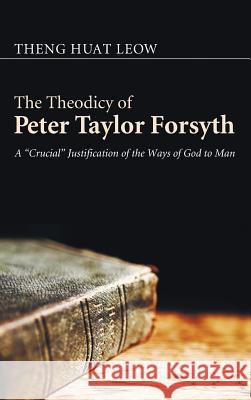The Theodicy of Peter Taylor Forsyth » książka
The Theodicy of Peter Taylor Forsyth
ISBN-13: 9781498256186 / Angielski / Twarda / 2011 / 286 str.
The Theodicy of Peter Taylor Forsyth
ISBN-13: 9781498256186 / Angielski / Twarda / 2011 / 286 str.
(netto: 226,07 VAT: 5%)
Najniższa cena z 30 dni: 234,14
ok. 16-18 dni roboczych.
Darmowa dostawa!
Description: The theodicy of the remarkable Scottish Congregationalist theologian Peter Taylor Forsyth has long been recognized as a vital and significant contribution to twentieth-century theology. Up until now, however, there has not been a substantial full-length treatment of Forsyth's work on the problem of evil. The Theodicy of Peter Taylor Forsyth fills this lacuna by setting out, in a fairly systematic and comprehensive manner, Forsyth's justification of God in the face of evil. In so doing, it also illuminates several other related areas of his thought, such as his epistemology and Christology, as well as his understanding of sin, the atonement, providence, divine passibility, human origins, and the God-world relationship. Bringing Forsyth's approach to the subject into conversation with other prominent thinkers like Leibniz, Dostoyevsky, Camus, Moltmann, Hick, Bauckham, and Fiddes, this book also suggests ways in which Forsyth's justification of God contributes to the current state of Christian theodicy. It highlights Forsyth's ability to integrate insights from different approaches, even those that have hitherto generally been considered diametrically opposed notions. Forsyth's theodicy therefore presents an integrative approach to the topic, with every theme flowing from and returning to a clear center: the cross of Christ. As the book also makes clear, Forsyth considers theodicy to be an immensely practical discipline, with significant implications for human life. In every sense, therefore, it constitutes a ""crucial"" justification of the ways of God to humanity. Endorsements: ""Of all the theodicies published during World War I, P. T. Forsyth's is the bravest and most significant. As one not inclined to book-cover hyperbole, I cordially welcome this book, which breaks new ground in the treatment of this crucial theme. No future study of Forsyth's theodicy will be complete if account is not taken of the contextually grounded, bibliographically aware exposition so lucidly presented here."" -Alan P F Sell Milton Keynes, UK ""This valuable analysis of P. T. Forsyth's work focuses on his significant 1916 wartime publication on theodicy. In doing so, it also offers a clear and consistent account of his wider theological contribution through dealing with themes of divine grace, the person and work of Christ, secondary acts of divine judgment, and universal human redemption. An informed and reflective study, this will establish Dr. Leow as one of the leading interpreters of P. T. Forsyth's work today."" -David Fergusson University of Edinburgh About the Contributor(s): Theng Huat Leow is a Lecturer in Theology at Trinity Theological College, Singapore.
Description:The theodicy of the remarkable Scottish Congregationalist theologian Peter Taylor Forsyth has long been recognized as a vital and significant contribution to twentieth-century theology. Up until now, however, there has not been a substantial full-length treatment of Forsyths work on the problem of evil. The Theodicy of Peter Taylor Forsyth fills this lacuna by setting out, in a fairly systematic and comprehensive manner, Forsyths justification of God in the face of evil. In so doing, it also illuminates several other related areas of his thought, such as his epistemology and Christology, as well as his understanding of sin, the atonement, providence, divine passibility, human origins, and the God-world relationship.Bringing Forsyths approach to the subject into conversation with other prominent thinkers like Leibniz, Dostoyevsky, Camus, Moltmann, Hick, Bauckham, and Fiddes, this book also suggests ways in which Forsyths justification of God contributes to the current state of Christian theodicy. It highlights Forsyths ability to integrate insights from different approaches, even those that have hitherto generally been considered diametrically opposed notions. Forsyths theodicy therefore presents an integrative approach to the topic, with every theme flowing from and returning to a clear center: the cross of Christ. As the book also makes clear, Forsyth considers theodicy to be an immensely practical discipline, with significant implications for human life. In every sense, therefore, it constitutes a ""crucial"" justification of the ways of God to humanity.Endorsements:""Of all the theodicies published during World War I, P. T. Forsyths is the bravest and most significant. As one not inclined to book-cover hyperbole, I cordially welcome this book, which breaks new ground in the treatment of this crucial theme. No future study of Forsyths theodicy will be complete if account is not taken of the contextually grounded, bibliographically aware exposition so lucidly presented here.""-Alan P F SellMilton Keynes, UK""This valuable analysis of P. T. Forsyths work focuses on his significant 1916 wartime publication on theodicy. In doing so, it also offers a clear and consistent account of his wider theological contribution through dealing with themes of divine grace, the person and work of Christ, secondary acts of divine judgment, and universal human redemption. An informed and reflective study, this will establish Dr. Leow as one of the leading interpreters of P. T. Forsyths work today.""-David FergussonUniversity of EdinburghAbout the Contributor(s):Theng Huat Leow is a Lecturer in Theology at Trinity Theological College, Singapore.











